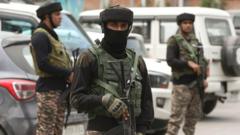**The recent approval of a $1 billion bailout to Pakistan by the IMF, alongside India’s vocal opposition, raises questions about the efficacy of international financial systems in geopolitical contexts.**
**India's Efforts to Prevent IMF Bailout for Pakistan Fall Short**

**India's Efforts to Prevent IMF Bailout for Pakistan Fall Short**
**In a complex geopolitical landscape, India's attempts to block a crucial IMF bailout for Pakistan highlight the intricacies of international economics and diplomacy.**
In a significant development last week, the International Monetary Fund (IMF) greenlit a $1 billion bailout to Pakistan, a decision that has evoked strong criticism from India amidst escalating military tensions between the two neighboring nations. The IMF’s approval is part of a larger $7 billion loan package aimed at bolstering Pakistan’s economy, which is said to be on a path to recovery due to effective implementation of reform measures, as stated by the IMF board.
Despite India's protests, which hinged on concerns over Pakistan's history of utilizing financial support for alleged terrorism, the fund affirmed its commitment to aiding Pakistan, especially against climate challenges—essentially pledging additional funding of approximately $1.4 billion in forthcoming resources. India articulated its discontent through a forceful statement expressing skepticism regarding the effectiveness of such bailouts and warning against the potential misuse of funds for promoting cross-border terrorism.
The IMF did not respond to India's critiques at the time, yet even Pakistani analysts acknowledge some validity in India's arguments about the continuous reliance of Pakistan on IMF assistance without significant reforms, as evident from its historical 24 instances of seeking financial help since 1958.
Analysts note that India’s attempts to halt the bailout were more symbolic than practical. Given its limited influence as one of the smaller stakeholders on the IMF board, with only a 2.6% voting share compared to the US's 16.49%, it was constrained by procedural norms that typically favor consensus. Furthermore, India's initiatives to challenge this systemic imbalance during discussions in its G20 presidency have yet to see substantive progress.
Recent data indicates that new IMF funding stipulations for countries in conflict complicate matters; for instance, Ukraine received a $15.6 billion loan amid ongoing war, setting a precedent that complicates restrictions on financial aid to Pakistan.
To further address its grievances regarding financial irregularities and perceived terror sponsorship, experts suggest that India’s best course of action may lie within the framework of the Financial Action Task Force (FATF). The FATF, which monitors anti-terror financing measures, can significantly influence Pakistan's access to international funds by placing it on restrictive lists.
However, experts caution that advocating for broader reforms in the IMF, while aiming to diminish China's influence, could backfire and ultimately enhance Beijing's power within financial institutions.
In conclusion, India faces a nuanced challenge as it navigates the intricate landscape of international finance, diplomacy, and its own strategic interests, all while Pakistan remains unshackled from the earlier constraints imposed by financial blacklisting.
Despite India's protests, which hinged on concerns over Pakistan's history of utilizing financial support for alleged terrorism, the fund affirmed its commitment to aiding Pakistan, especially against climate challenges—essentially pledging additional funding of approximately $1.4 billion in forthcoming resources. India articulated its discontent through a forceful statement expressing skepticism regarding the effectiveness of such bailouts and warning against the potential misuse of funds for promoting cross-border terrorism.
The IMF did not respond to India's critiques at the time, yet even Pakistani analysts acknowledge some validity in India's arguments about the continuous reliance of Pakistan on IMF assistance without significant reforms, as evident from its historical 24 instances of seeking financial help since 1958.
Analysts note that India’s attempts to halt the bailout were more symbolic than practical. Given its limited influence as one of the smaller stakeholders on the IMF board, with only a 2.6% voting share compared to the US's 16.49%, it was constrained by procedural norms that typically favor consensus. Furthermore, India's initiatives to challenge this systemic imbalance during discussions in its G20 presidency have yet to see substantive progress.
Recent data indicates that new IMF funding stipulations for countries in conflict complicate matters; for instance, Ukraine received a $15.6 billion loan amid ongoing war, setting a precedent that complicates restrictions on financial aid to Pakistan.
To further address its grievances regarding financial irregularities and perceived terror sponsorship, experts suggest that India’s best course of action may lie within the framework of the Financial Action Task Force (FATF). The FATF, which monitors anti-terror financing measures, can significantly influence Pakistan's access to international funds by placing it on restrictive lists.
However, experts caution that advocating for broader reforms in the IMF, while aiming to diminish China's influence, could backfire and ultimately enhance Beijing's power within financial institutions.
In conclusion, India faces a nuanced challenge as it navigates the intricate landscape of international finance, diplomacy, and its own strategic interests, all while Pakistan remains unshackled from the earlier constraints imposed by financial blacklisting.





















